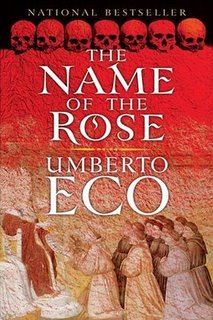The Name of the Rose by Umberto Eco

Recently, I've been doing some reasearch for a long awaited trip to Italy with my husband. Early on I came to the conclusion that we can't afford it, the airfare wouldn't be a problem but the hotels are a fortune. Then I stumbled across a snippet online about staying in convents. After a LOT of digging I found a few books that show you where to stay and what to expect. When the Catholic church started having fewer and fewer nuns and monks their abbeys were rather empty. I suspect their coffers were too. So many have converted the old, unused cells into cheap accomadations for visitors. Since I've delved into my
book that describes all of the monastaries and convents I've been bombarded with things of a monastic nature. Just a few examples: while at Borders I had a man ask me if I had read
The Cloister Walk, and then a few days later I passed by
The Name of the Rose and came to a screeching halt in my tracks. I have never read this book. I am however, well aware of the story. See, when I was little my parents would send us off to bed and watch movies that were not child appropriate, (even if they were fine for us to watch I suspect they wanted some time alone). Our house had been added onto years before we moved into it. As a result, the livingroom and the hallway to the bedrooms had three small stairs connecting them. Now, you could creep out of bed and provided your little brother didn't give you away, watch whatever the parents were watching and they would never see you as their backs were turned just right.
WARNING: SPOILER It was in this manner: in the dark hallway of my childhood, that I first came to see sixteen year old Christain Slater have sex with a half-feral girl (I was then so horrified by the amount of dirt on her that it must have blocked out the shock of people having sex).
To my seven year old self sex was just yet another vague and weird thing that adults did. My other strong memory was of an old man screaming to Sean Connery that laughing made people look like monkeys and then tipping a candle over and burning down a bunch of books. Oh man, I went straight to bed. I wasn't going to watch some lunitic treat books in that way. I had nightmares for days afterwards of people burning books.
END SPOILER Seeing the literary hand of Fate deal me that, I snatched it right up and took it home with me. The following is an excerpt of the book from the author’s notes:
“On August 16, 1968, I was handed a book by a certain Abbe´ Vallet. De Manuscrit de Dom Adson de Melk, traduit en francais d`apre´s l`e´´´de Dom J. Mabillion. Supplemented by historical information that was actually quite scant, the book claimed to reproduce faithfully a fourteenth-century manuscript, that in its turn, had been found in the monastery of Melk, by the great eighteenth-century man of learning to whom we owe so much information about the Benedictine order. The scholarly discovery, (I mean mine), entertained me while I was in Prague, waiting for a dear friend. Six days later Soviet troops invaded that unhappy city. I managed, not without adventure to reach the Austrian border at Linz, and from there I journeyed to Vienna, where I met my beloved, and together we sailed up the Danube.
In a state of intellectual excitement, I read with fascination the terrible story of Adso of Melk and I allowed myself to be so absorbed by it in almost a single burst of energy, I completed a translation, using some of those large notebooks from the Papererie Joseph Gilbert in which it is so pleasant to write if you use a felt-tip pen. And as I was writing, I reached the vicinity of Melk, where, perched over a bend in the river, the handsome Stift stands to this day, after several restorations, during the course of the centuries.”
See, now I’m hooked. History, mystery and a man’s love of how a certain kind of paper feels under a certain kind of pen. Now I HAVE to read it.

 Here's a little cartoon that makes me snicker every time I look at it. It reminds me so much of
Here's a little cartoon that makes me snicker every time I look at it. It reminds me so much of 


